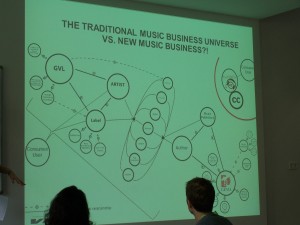The panel “New Markets for Free Music” looked at the shifts within the music scene.
John Weitzmann analyzed in his paper the way the German national collecting society GEMA is not working anymore. The GEMA only legally represents all artists, but in fact, a lot of the music is represented by different organizations. One result: Music of artists who are not GEMA members is played less to avoid problems. Weitzmann acknowledges that GEMA is doing some improvements on the software side. Anyhow he suggests transferring the issue of collecting royalties for the artists to a state agency, which serves as an independent body that works together with all organizations.
Netlabels vs. Indie labels
Cornelia Zacharias examined the difference between netlabels and indie labels in Germany. For her the definition of netlabels is distribution via the web in combination with a Creative Commons license. In contrary, indie labels are a niche within the existing system. They act within the traditional royalty system of the GEMA (and therefore exclude creative commons) and they are mostly for profit-organizations. Zacharias concludes that there are two universes: the one of the traditional music scene (whereas indie labels are part of it) and the other of net labels and creative commons. The following slide from her presentation visualizes the idea:
Zacharias argues that this will not change soon. Because of path dependence the traditional music industry is likely to protect their revenue channels and will not open up themselves to alternative licensing models
Commons sense
This was the motto of the presentation of Volker Grassmuck. He debunked myths about the results of P2P-filesharing. He reviewed numerous literature and came to the conclusion that P2P-filesharing is not responsible for the decline of CD sales. With the emergence of every recording technology, the sale of the previous recording technology dropped sharply. Why does this matter in the case of P2P-filesharing? Grassmuck coins the term of the “Digital Right Management Hole”. People were aware of the power of the web; the music industry offered no channels to buy MP3 online so P2P-filesharing emerged. However, with the rise of iTunes one observes increasing sales of online MP3s.
Grassmuck also reveals that intense P2P-fileshare users also buy a lot of music and visit a lot of concerts. Casual P2P users just do less of those activities. He combines the phenomenon of P2P-filesharing with the skyrocketing development of the concert market. Grassmuck provided an outlook of a research project in Brazil that is conducted complementary to a planned copyright law reform. Goal of this study is to illuminate to gain empirical insights into “into national and cross-border file-sharing activities.” Grassmuck closed his presentation by saying: „We need a commons sense instead of common sense“
Mike Linksvayer criticized some studies of this session but looks forward to more empirical research.



 Die
Die